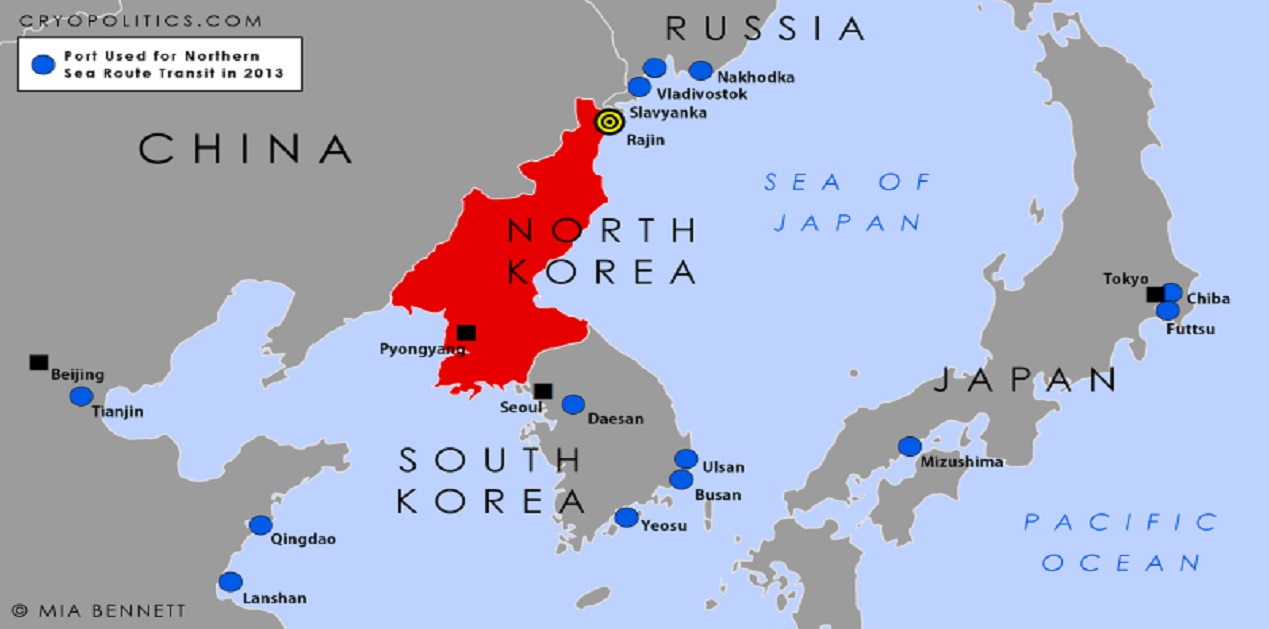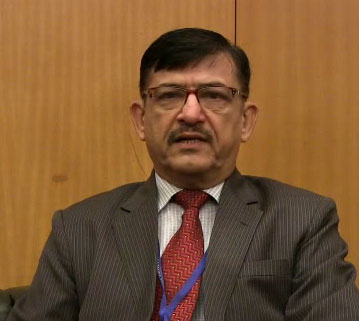Amid high decibel ‘verbal exchanges’ between US President Donald Trump and North Korean leader Kim Jong Un over latter’s nuclear ambition, the United Nations Security Council announced on 22 December 2017 new economic sanctions against Democratic People’s Republic of Korea (DPRK). The current sanctions, the ninth in the series since 2006, were pursuant to the recent intercontinental ballistic missile tests conducted by Pyongyang. These include limiting DPRK access to energy resources with ‘ban on condensates and natural gas liquids, a cap of 2 million barrels a year on refined petroleum products and a cap on crude oil exports to North Korea at current levels’.
The international shipping has in the past scrupulously adhered to UN sanctions and refrained from transporting embargoed goods to DPRK, barring a few vessels that were suspected of defying the sanctions. The US had also sought blacklisting of at least 10 vessels that are involved in illegally transferring oil at sea to be delivered to North Korean. These suspected vessels are flagged in Panama, Hong Kong and other registries including DPRK’s own register. Russian oil tankers were also suspected of providing ‘lifeline to the regime’ by engaging in ship-to-ship transfer at sea. The US put out satellite images of a North Korean ship trying to conduct a ship-to-ship transfer in October 2017, and President Donald Trump accused China ‘being caught red-handed selling oil to North Korea’.
The Panama Maritime Authority announced cancellation of registration of ship Koti operating under its flag (detained at a port in South Korea), and suspected of breaching the UN sanctions against North Korea. Another vessel, the Hong Kong flagged Lighthouse Winmore, also suspected of transferring refined petroleum products to the North Korean ship, the Sam Jong-2 in October 2017, was seized and remains in South Korea. Meanwhile, Taiwanese authorities brought before court a man ‘prosecutors allege to have made false declarations in the case of a Hong Kong-flagged tanker suspected of transferring oil to North Korea in violation of international sanctions’, but was later released on bail.
In the past, a number of North Korean vessels have been detained for carrying embargoed cargo. In fact, the country has a rich history of transporting illegally a variety of commodities ranging from drugs, small arms and weapons, oil and gas, missiles and even weapons of mass destruction. For instance, in 1999 the Indian authorities detained in the port of Kandla MV Ku Wol San, a North Korean vessel carrying Weapons of Mass Destruction (WMD) accessories bound for Pakistan/Libya. On August 6, 2009, the Indian Navy undertook VBSS (visit, board seize and search) operations in the Andaman Sea against a North Korean vessel in support of UN Security Council Resolution No. 1874 that ‘strengthens arms embargo, calls for inspection of cargo vessels if states have ‘reasonable grounds’ to believe contain prohibited items’.
The ongoing imbroglio over the ship-to-ship transfer at sea in breach of the UN sanctions against DPRK has brought to fore the weaknesses in the Flag of Convenience (FoC) regime, which has been under scrutiny by the law enforcement agencies and international community. Linking ‘a State’, ‘a ship’ and ‘a flag’ is an age old practice and documented in antiquity. It helps to determine who owns the vessel, or has jurisdiction over it, and therefore empowered to prosecute it in case it is engaged in any illegal activity, or defend its operations in case national interests are in jeopardy.
As with any commercial enterprise, international shipping is market driven and therefore competitive. The primary aim of any shipping company is to enhance fiscal advantage, maximise revenue, and minimise costs. Ship owners’ carefully choose register for their ships and hence fly that country’s flag. In essence, economics is the decisive factor that will determine the flag a ship flies. Likewise, it is a win-win situation for the FoC registries. This practice generates revenue for the flag state in the form of fees, transactions and services provided to the ships seeking registration. These funds are critical for the flag state and bring in significant income. This widespread phenomenon has resulted in larger percentage of the world fleet under the FoC when compared with the traditional maritime countries themselves.
Since the last century, the practice of ‘closed registers’ witnessed changes due to stringent domestic manning regulations, restrictive taxation regime, and other commercial considerations in home countries. Panama was the first to set up an ‘open register’ in 1916, and by 1950 there were more open registers and accounted for nearly 4 per cent of the world’s fleet. In the mid-1980s, the share of FoC in international shipping registration increased to over 30 per cent and by 2009, nearly 73 per cent of the global merchant fleet was under open registers. According to 2017 UN Conference on Trade and Development (UNCTAD) report, today more than 70 per cent of the commercial international fleet is flagged out and registered under a different flag from the country of ownership.
Interestingly, there are agencies which specialize in helping shipping companies to obtain FoC registries, For them it is a business model, and according to ‘ship solutions’, an agency which specializes in such a venture since 2010, they help shipping companies and owners to register or reflag ships. The agency enables ‘ship managers to streamline their operations during peak times and leave the registration of the vessels to us … to keep overheads to a minimum and thus … offer a very competitive price and can perform jobs of any size within a tight timescale’.
It is a fact that States operate FoC registry to ‘earn a great deal of money, usually from registration and maintenance fees and taxes, from the ships in its registries, but expend very little money to ensure that such ships meet international standards’. Further, FoC offers numerous opportunities to devious ship owners to “hide so long as they pay the requisite registration fees and tonnage taxes, leading to dangerous consequences, such as the funding of terrorist activities and lack of liability for substandard ships sailing the high seas”.
In the case of DPRK, it has skillfully used the FoC regime and engaged in maritime commerce violating various UN sanctions. Of particular interest is Ocean Maritime Management (OMM) Limited, a shipping company with operations in at least 10 countries, has a dubious record of engaging in illegal activities at sea. The company has taken advantage of the FoC regime and been renaming its vessels. For instance, it has not only renamed as many as 13 of its 14 vessel , but also transferred the ownership to shell companies. This is perhaps a clever way to, reflag the vessels and thus ‘effectively erase’ these vessels from the ‘blacklist’, ‘a strategy to evade assets freezes’ by the international community. For instance, the U.N. Security Council’s Panel of Experts on North Korea, that monitors implementation of sanctions on Pyongyang, blacklisted OMM for ‘arranging an illegal shipment on the Chong Chon Gang ship, which was seized in Panama and found to be carrying arms, including two MiG-21 jet fighters, hidden under thousands of tons of Cuban sugar’. However, the company was not deterred and OMM evaded ‘sanctions by changing the registration and ownership of vessels’ to a shell company.
Some DPRK flagged vessels have been intercepted while carrying military cargo bound other States. For instance, in December 2002, So San, a North Korean vessel carrying fifteen Scud missiles hidden under cement bags and bound was Yemen intercepted by a Spanish frigate and a support vessel Patino in the Indian Ocean. The vessel was allowed to proceed to its destination after the Yemen government announced that the consignment was bound for it and it has been argued that ‘there was no provision under international law prohibiting Yemen from accepting delivery of missiles from North Korea’. Similarly, in 2016, one of the OMM ships was apprehended for carrying imported weapons from Cuba, but authorities ‘in Havana admitted being behind the stash, saying they were Soviet-era arms from Cuba headed for repair in North Korea’.
Given the complexity of the political economy of merchant shipping and its close relationship with global economy, the FoC system has the potential of being a major challenge for the safety of ships, national security in general, and maritime security in particular. International law (1982 United Nations Convention on the Law of the Seas, Articles 90, 91, 92, 94 and 110; United Nations Convention on Conditions for Registration of Ships; Convention on the International Maritime Organization) and national legislations stipulate the mandatory requirement of a genuine link between ship and flag state. This is so due to the need for ‘an absolute minimum entity’ which can be made responsible for the ‘actions of the ship owner and on which penalties of adequate severity can be levied so as to discourage violations of applicable international minimum standards’ wherever they occur.
While that may be necessary, North Korea has blatantly yet cleverly, contravened international law and successfully defied UN sanctions. In the future too, it can continue to marshal its national shipping fleet as also other FoC vessels to conduct illegal commerce and clandestinely obtain embargoed goods from the international market. It is fair to state that North Korean leader Kim Jong Un is not perturbed by UN sanctions and DPRK will continue flagrant violation of sanctions.
(Dr Vijay Sakhuja is former Director National Maritime Foundation, New Delhi)
(Views expressed are of the author and do not necessarily reflect the views of the VIF)
Image Source: http://www.cryopolitics.com/2014/05/08/north-korea-and-the-northern-sea-route/










Post new comment